Elder abuse in Australia: Wills, powers of attorney and family agreements
Findings from the National Elder Abuse Prevalence Study
Download Research snapshot
This snapshot discusses elder abuse and presents material that some people may find distressing. If you or someone you know needs assistance, please call 1800 ELDERHelp (1800 353 374). A list of elder abuse support services is available at the end of this snapshot. If you are in immediate danger call Police on 000.
Overview
As part of the National Plan to Respond to the Abuse of Older Australians (Council of Attorneys-General, 2019), the Attorney-General's Department commissioned the National Elder Abuse Prevalence Study (NEAPS) to investigate elder abuse. This snapshot provides the key findings of the Survey of Older People (2020), a nationally representative survey of 7,000 people aged 65 and over living in the community (i.e. they did not live in residential aged care settings). The full report on the NEAPS is available on the AIFS website.
How common is it for older people to have a will?
The Survey of Older People indicated that most (88%) community-dwelling people aged 65 and older in Australia reported currently having a will. Seven per cent did not have a will but had had a discussion with someone in their family about making one.

The proportion of older people who had a will rose with increasing age from 80% of older people in the age group of 65-69 years to 91% of people in the group of 75-79 years, and 97% in the oldest age group (85+ years).
Although most older people had a will, older people from a CALD background were less likely than other older people to have a will. Lower socio-economic status was also associated with lower levels of will making.
What is a will?
A will is a legal document that details what a person would like to happen with their property upon their death and provides instructions for a nominated person or organisation to distribute the property in accordance with the will.
How common is it for older people to appoint an enduring power of attorney?
Having an enduring power of attorney is much less common than having a will.
- Just over one-half of participants (52%) indicated that they had granted someone an enduring power of attorney.
- Fifteen per cent did not have one but had had a discussion with someone in their family about making a power of attorney.

Of the participants who had an enduring power of attorney most (86%) confirmed that their current power of attorney was active (i.e. can be used when needed).

A slightly higher proportion of women than men indicated having an enduring power of attorney (54% and 49% respectively) but gender differences were limited. Levels of having an enduring power of attorney in place increased with age from 33% in the age group 65-69 years, to 48% in the age group 75-79 year and 61% in the oldest group (85+). Lower socio-economic status and CALD backgrounds were associated with lower levels of having an enduring power of attorney.
Who is granted the power of attorney?
Figure 1: Older persons who have a valid/active power of attorney: Who is the attorney?
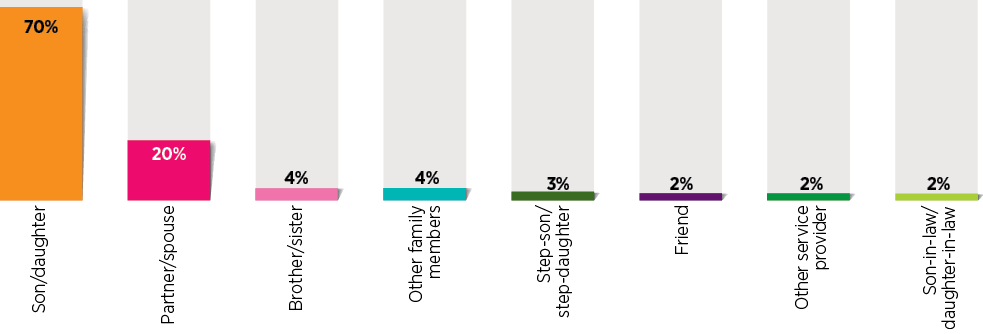
What is an enduring power of attorney?
An enduring power of attorney is a legal document that enables a person to nominate another person or organisation to make decisions about financial and/or personal matters if they are unable to make these decisions for themselves. The person nominated is the 'attorney' and their power to make decisions is 'enduring' because it endures or continues when the person granting the power is no longer able to make their own decisions.
How common is it for older people to have family agreements?
In contrast with the substantial proportions of participants who reported having a will or having an enduring power of attorney, family agreements were much less common.

Of those with such agreements, just under two-thirds indicated that their family agreement was in writing.
Reports of family agreements were similar for men and women. Levels of making family arrangements increased with age (from 1% of people in the age group 65-69 years to 7% of those in the oldest age group 85 years and over). Lower socio-economic status and CALD backgrounds were associated with higher levels of making family agreements.
Who are family agreements made with?
Figure 2: Relationship to older persons of those with whom the family agreement arrangements were made
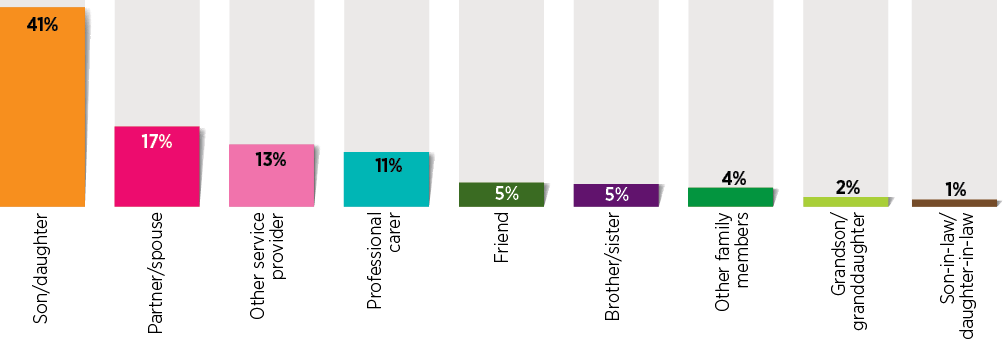
What is a family agreement?
A family agreement is defined as an agreement to provide care to an older person in return for financial support or benefit (e.g. transfer of assets, property or finances) or bequest in a will.
Prevalence of elder abuse and advance planning arrangements
The prevalence of elder abuse varied according to type of advance planning arrangement.
- Having a will was associated with a lower level of elder abuse, with 14% of older people with a will reporting an experience of at least one type of elder abuse, compared to 20% of those without a will.
- Having a power of attorney was also associated with a lower level of elder abuse. Thirteen per cent of older people with an active power of attorney (i.e. can be used when needed) reported an experience of elder abuse, compared to 17% of those without a power of attorney. It was 15% for those who had a power of attorney that was no longer active.
- Family agreements were associated with a higher level of elder abuse: 21% of older people who had family agreements reported an experience of elder abuse, compared with 15% who did not have family agreements. It is important that older people obtain legal advice and make an informed decision before entering family agreements.
Support services/Helplines
- If you have any concerns about potential or actual elder abuse, please contact 1800 ELDERHelp (1800 353 374) to be redirected to the existing phone line service in your state or territory (free call).
- If you or someone you know have experienced violence or sexual assault and require immediate or ongoing assistance, contact 1800 RESPECT (1800 737 732) to talk to a counsellor from the National Sexual Assault and Domestic Violence hotline.
- For confidential support and information, contact Safe Steps' 24/7 family violence response line on 1800 015 188 or the Men's Referral Service on 1300 766 491.
- For a confidential discussion with an experienced counsellor, call Lifeline on 13 11 14.
Elder abuse in Australia: Prevalence
Elder abuse in Australia: Physical abuse
Elder abuse in Australia: Psychological abuse
Elder abuse in Australia: Financial abuse
Elder abuse in Australia: Sexual abuse
Elder abuse in Australia: Neglect
Elder abuse in Australia: Culturally and linguistically diverse Australians
Featured image: GettyImages/fzant
Australian Institute of Family Studies. (2022). Elder abuse in Australia: Wills, powers of attorney and family agreements. (Findings from the National Elder Abuse Prevalence Study). Melbourne: Australian Institute of Family Studies.
Download Research snapshot
Related publications
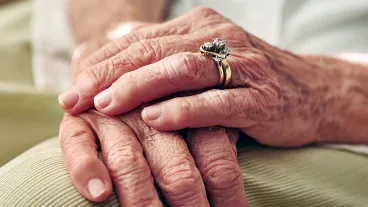
Elder abuse in Australia: Sexual abuse
This snapshot provides key findings from the Survey of Older People (2020), a nationally representative survey of 7,000…
Read more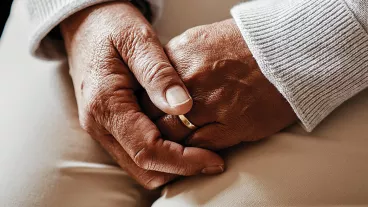
Elder abuse in Australia: Neglect
This snapshot provides key findings from the Survey of Older People (2020), a nationally representative survey of 7,000…
Read more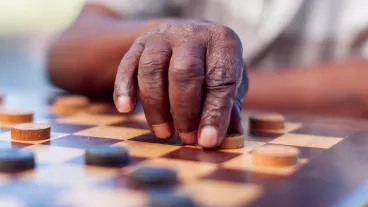
Elder abuse in Australia: Culturally and linguistically…
This snapshot provides key findings from the Survey of Older People (2020), a nationally representative survey of 7,000…
Read more